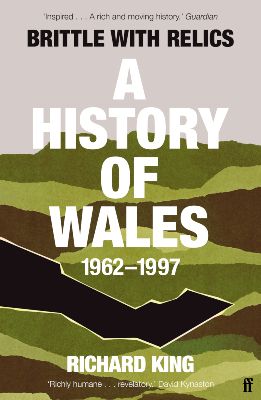In March 2022, Wales played Ukraine in the play-off final for the World Cup in Qatar. In driving rain, before the singing of the national anthems, Dafydd Iwan, a 78-year-old Welsh “folk singer”, gave an “impassioned rendition” of his famous inspirational song of tenacity and defiance”, Yma o Hyd.
A Motivating Anthem
It was a performance that the Welsh team had requested since the song had become a motivating anthem for them and supporters (Y Wal Goch or The Red Wall). For the thousands at the game and the millions viewing it on TV, the performance of “Yma o Hyd” (Still Here) was an emotional and uplifting event. It left many supporters and Dafydd Iwan in tears.
Many supporters have been keen to understand the significance of the words of “Yma o Hyd” and its history. Richard King’s Brittle With Relics explores a significant period in the history of Wales from 1962-1997.
The author generates an in-depth insight into the “feelings of the people” affected by deindustrialisation, struggles for identity, status for the Welsh language, and a lack of “voice and influence” in decision-making.
The research is based on contributions from over 90 people. Including political, industrial, and social leaders, mine workers, and children from Aberfan.
This method gives a voice to those actively involved in the struggles and the movements promoting change. It makes for a challenging and emotionally disturbing reading. The author provides fresh insights into the causes and impact of decisions made by those holding power.

A Growing Concern
The author notes that the late 1950s and early 60s heralded a growing concern that the Welsh language was facing a crisis. Administrators in central government, local authorities, education and commerce failed to recognise, or respond to, calls for greater status for the language.
A growing number of adults, particularly students in Wales, were keen to liberate themselves from the stance of respectability (parchus) towards aristocratic landowners, employers and those holding power.
The “together stronger” model aimed to remove the regressive attitude towards the Welsh language. It resulted in the formation of the direct action pressure group “Cymdeithas yr Iaith Cymraeg” (The Welsh Language Society).
This pressure group promoted non-violent action but were determined to change the attitude of those in power. They pushed for bi-lingual education and road signs.
Dafydd Iwan’s inspirational songwriting focused on key issues, developed people’s knowledge and raised awareness of what was happening. This direction created the impetus to generate a real push for the “together stronger” approach to change and achieve a “shallow piece of dignity”.
Heightened Tensions
The book’s strength lies in how key episodes exposed how the attitudes of those in power affected the Welsh people and generated an enthusiasm for change. The tragic events at Tryweryn and Aberfan heightened tensions even further.
The flooding of Capel Celyn in the Afon Tryweryn valley to build a reservoir to pump water to the City of Liverpool created anger and frustration throughout the whole of Wales. The book highlights how those in power ignored protests.
Many readers may be surprised at the nonchalant attitude displayed by political leaders and the arrogance displayed by Liverpool Corporation. These responses reflected the evidence from Dr Rowan Williams that Welsh people were considered subaltern (lower status) people within a subaltern culture.
Cofiwch Dryweryn
Many consider that the slogan “Cofiwch Dryweryn” (Remember Tryweryn) encapsulated the need for a more assertive approach for Welsh identity. Readers may find the overview of the tragedy at Aberfan challenging and emotionally distressing.
The author recalls how Tip 7 collapsed and the tidal waves of slurry destroyed a farm cottage and its occupants. It also engulfed the school and several village houses.

A Range of Injustices
It took a week to retrieve the 144 victims from the quagmire, including 116 schoolchildren. The Aberfan community experienced a range of injustices at the hands of the authorities, particularly the Coal Board’s initial failure to admit that they were culpable.
The inspirational song “Yma o Hyd” was first released in 1983. It emphasises how the language was still thriving despite the attempts to relegate it to a “level of unimportance”. A member of Liverpool Corporation described Welsh as “nothing more than a rural dialect spoken by peasant farmers”.
In the epilogue, the author highlights how battles over language had become irrelevant to generations under 40 until the game against Ukraine,
They were oblivious that over a thousand adults were prosecuted. The majority were incarcerated while fighting for a Welsh identity and the language’s survival. This lack of awareness is because teaching Welsh history was not compulsory in schools until 2022.
Richard King has produced an inspirational, thought-provoking and challenging historical background on how Wales has made so much progress in increasing its status during the last 20 years.
The efforts of campaigners such as Dafydd Iwan, who refused to be repressed, have reignited the desire to recognise Cymru (Wales) and Cymraeg (the Welsh language). Well worth a read.
Finally, for more book reviews, click here.


